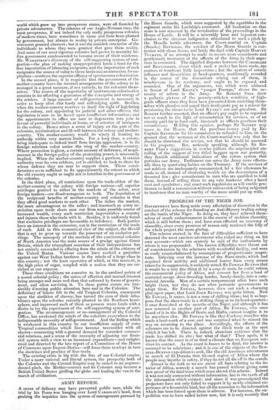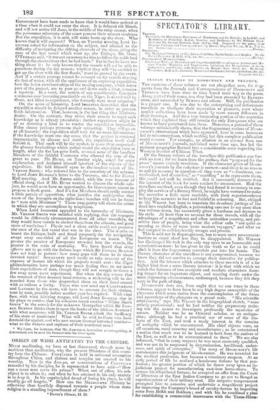PROGRESS OF THE NIGER JOB.
GOVERNMENT have flung aside every affectation of discretion in the conduct of the scheme for founding an Anti-Slavery trading colony on the banks of the Niger. In doing so, they have relieved them- selves of much embarrassment in the course of reckless absurdity which is still before them ; and have even effected an economy of absurdity, since every pretence of reason only rendered the folly of the whole project the more glaring. The scheme started in the face of difficulties sufficient to have deterred the most careless adventurer who risked any thing on his own account—which can scarcely be said of the enthusiasts by whom it was propounded. The known difficulties were thrust out of consideration by the schemers with wonderful facility, and were as easily counterbalanced by assumptions of proportionate magni- tude. Grieving over the increase of the Slave-trade, which had acquired fresh activity and additional horror from every means taken for its suppression, it suddenly struck Sir FOWELL BUXTON that it would be a very fine thing if, by a coup de main, he could reform the commercial policy of Africa, and convert her from a land of scattered savage slave-breeding hordes, handy-dandy, into a com- mercial Arcadia. Men of a certain temperament often have such bright ideas, but they do not often persuade governments to adopt them. Sir FOWELL, however, drew out such a charming plan upon paper, that Lord JOHN RUSSELL was quite bitten. Now Sir FOWELL, it seems, is not a man of shifting ideas ; but it so hap- pens that the slave-trade is a shifting thing as to its head-quarters : it once flourished at the mouths of the Niger, and although it has now removed to another part of Africa, Sir FOWELL, Who once heard of it in the Bights of Benin and Biafra, cannot imagine it to be anywhere else. Sir FOWELL is like that Cockney traveller who made a land-mark of a cow, and was surprised when he missed his way on returning to the place. Accordingly, the efforts of the schemers are to be directed against the illicit trade at the spot which it has left. There is, indeed, abundant evidence that the trade has shifted its site; but what of that ? Then again, it is known that the coast is of so fatal a climate that no European sur- vives its contact. As the coast is known to be fatal, the interior is assumed to be salubrious ; and it is one of the objects of the Res- SELL-BUXTON expedition to seek, like the old American adventurers in search of El Dorado, that blessed region of Africa where the people may breathe in safety, if they do not all die off in the search. Almost in the dark as we are about all fasts relating to the in- terior of Africa, scarcely a month has passed without giving some new proof of the fatal issue which must attend this scheme. Indeed it was not only concocted without information, but in the teeth of all the information which existed ; and since it was promulgated the projectors have not only failed to support it by newly-obtained ex- perience of a favourable kind, but all the accession to the information which has been forced upon them is adverse. For instance, the ex- pedition was to have sailed before now, but it is only recently that Government have been made to know that it would have arrived at a.time when it could not enter the river. It is delayed till March, and will not arrive till June, in the middle of the rainy season, when the poisonous miasmata of the coast possess their utmost virulence But the expedition, it is said, will make haste up the river. Who knows that it will succeed? When, on Tuesday evening, Lord IN- GESTRE asked for information on the subject, and alluded to the difficulty of navigating the shifting channels of the river, citing the case of the last vessel which went up, the Ethiope, Mr. Moan Marta ara. said, "it was not necessary for him to follow the noble lord through the observations that he had made." For in fact he knew no- thing about it : he only knows that the vessels will not be able to penetrate during the dry season ; whether they will "be enabled to set up the river with the first floods," must be proved by the event. And if a certain passage cannot be counted on for vessels drawing six feet of water, with all the appliances of an exploring expedition, low the laden merchant-ships of the trading company, which forms part of the project, are to pass up and down such a river, remains a mystery. In a word, the notion of any considerable European commerce erer becoming practicable on the Niger, is abandoned by those, not blind to experience, who formerly were most sanguine.* On the score of humanity, Lord INGESTRE demanded that the expedition should be delayed another season, in order to procure fresh information. That, however, is the last thing that :Nlinisters desire. On the contrary, they strive their utmost to repel such knowledge as is already procurable : further experience might be of so damning a kind as to render the expedition impossible. False shame perhaps prevents their retracting. They will go on at all hazards : the expedition shall wait for no more information : if the knowledge must one day come that the project is rendered impracticable by disease and death, the expedition itself shall furnish it. That such will be the upshot, is more than suspected : the gloomy forebodings which gather round the expedition have at length, after the fiat has gone forth, aroused some of the heedless Members of the faithful Commons who allowed the vote of the 'grant to pass. Mr. HUME, on Tuesday night, asked for some explanation, and declared himself ignorant of the objects of the expedition. He laid himself open to the insolent retort of Mr. Irxstaorr SMITH; who referred him to the notoriety of the scheme, to Lord JOHN RUSSELL'S letter to the Treasury, and to the E:eeter Hall meeting. And Mr. SMITH added, with the true humour of official slang, that if Mr. HUME wanted to discuss the whole sub- ject, he would soon have an opportunity, for Government meant to propose a fresh grant. And if a few Members should really muster a little parade of opposition, what justifies the anticipation that enow of the loungers on the right-hand benches will not be found to " vote with Ministers"? Those easy gentry will share the crime in which they are accomplices by misprision.
When Lord INGESTRE appealed to the humanity of Ministers, Mr. VERNON SMITH was satisfied with replying, that the voyagers would be differently circumstanced from all other travellers, for they would have vessels to shelter them from the climate, and good store of medicines ! Physic and a close cabin could not preserve the crew of the last vessel that was in the river. The deaths on board the Ethiope, built and fitted purposely for the navigation, swept away one-third of all the Europeans on board. The greater the number of Europeans crowded into the vessels, the greater is the ratio of mortality. We have heard that sixty officers are to go with the forlorn hope which Sir Fowora. BUXTON does not lead in person : how many gaps will there be in those devoted ranks ! BONAPARTE used coolly to take account of the expense of human life which his projects would cost : the Niger philanthropists have perhaps too much feeling thus to set down their expenditure of men, though they will not scruple to throw a few away upon mere experiment. But when the day comes that the remnant of that doomed band returns, a reckoning will be de- manded from those who despatched them on their fated errand with so callous a levity. Those who now send out CLAPPERTONS and LANDERS by the score, will have to account for their victims, man by man, possibly before another year has expired. With what face, with what faltering tongue, will Lord JOHN RUSSELL rise in his place to confess that his colonists found another "White Man's Grave" in the search for the unknown Montpelier which Sir Fow- zar. BUXTON thinks there is upon the banks of the African Avernus ! with what assurance will Mr. VERNON SMITH admit the inefficacy of his store of medicines ! What will be said to those who have foretold the upshot, and who now accuse them of intended murder— what to the widows and orphans of their murdered men ?
* We learn, for instance, that Mr. Tastinsos, heretofore so enterprising., is determined not to send his steamer into the river again.



























 Previous page
Previous page